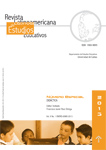Autores/as
Resumen
Las concepciones que tienen los maestros en formación inicial acerca de la educación científica están claramente influenciadas por sus experiencias personales y, especialmente, por la educación científica recibida. Desde una perspectiva constructivista, es fundamental partir de dichas concepciones para la planificación de su formación como maestros de ciencias. Este estudio presenta las concepciones de educación científica de una muestra de 328 maestros en formación inicial de las especialidades de Educación Infantil y Educación Primaria antes de iniciar la asignatura de Didáctica de las Ciencias Experimentales. El programa de la misma se estructura a partir de tres ejes: conceptual, actitudinal e ideológico. Y es a partir de estos tres ejes y de las categorías que emergen al analizar los textos escritos por los alumnos en la actividad “Mis clases de ciencias” que se analizan sus concepciones. Los resultados muestran que estas están centradas en los ejes conceptual e ideológico, siendo poco relevante el actitudinal. Asimismo, se establecen pocas relaciones entre los tres ejes mostrando una relación fragmentada y excluyente de los mismos.
Citas
Baines, L.A. y Stanley, G. (2000). “We want to see the teacher: Constructivism and the rage against expertise”. Phi Delta Kappan, No. 1, Vol. 55, pp. 91-114.
Bradley, J. (1968). Distribution-free statistical tests. Englewood Cliffs, NJ: Prentice Hall.
Bonil, J. y Márquez, C. (2011). “¿Qué experiencias manifiestan los futuros maestros sobre las clases de ciencias? Implicaciones para su formación”. Revista de Educación, No. 354, pp. 447-472.
Cochran-Smith, M. y Lytle, S. (1993). Inside/Outside: Teacher Research and Knowledge. New York, NY: Teachers College Press.
________. (1999). “Relationships of Knowledge and Practice: Teacher learning in communities”. In: A. Iran Nejad y C.D. Pearson (eds.). Review of Research in Education (Vol. 34, pp. 249-305). Washington, DC: American Educational Research Association.
Cowen, R. (2002). “Socrates was right? Teacher education systems and the state”. In: T. Elwyn (ed.). Teacher education: dilemmas and prospects (pp. 3-12). London: Kogan.
Davis, B. y Sumara, D. (2003). “Why aren’t they getting this? Working through the repressive myths of constructivist pedagogy”. Teaching Education, No. 14, pp. 123-140.
Day, C. (2002). “School reform and transitions in teacher professionalism and identity”. International Journal of Educational Research, No. 37, pp. 677-692.
Fishman, B.J., Marx, R.W., Best, S. y Tal, R.T. (2003). “Linking teacher and student learning to improve professional development in systemic reform”. Teaching and Teacher Education, No. 19, pp. 643-658.
Fives, H. y Buehl, M.M. (2008). “What do teachers believe? Developing a framework for examining beliefs about teachers’ knowledge and ability”. Contemporary Educational Psychology, No. 2, Vol. 33, pp. 134-176.
Garm, N. y Karlsen, G.E. (2004). “Teacher education reform in Europe: The case of Norway; trends and tensions in a global perspective”. Teaching and Teacher Education, No. 20, pp. 731-744.
Gordon, M. (2010). “Between Constructivism and Connectedness”. Journal of Teacher Education, No. 4, Vol. 59, pp. 322-331.
Gordon, M. y O’Brien, T. (eds.). (2007). Bridging the theory and practice in teacher education. Rotterdam, Netherlands: Sense Publishers.
Kang, N. (2010). “Learning to teach science: Personal epistemologies, teaching goals, and practices of teaching”. Teaching and Teacher Education, No. 24, pp. 478-498.
Kendall, M. (1938). “A New Measure of Rank Correlation”. Biometrika, No. 1-2, Vol. 30, pp. 81-89.
Lebart, L., Morineau, A. y Piron, M. (2000). Statistique exploratoire multidimensionnelle. Paris, France: Dunod.
Lindahl, B. (2007, April). A longitudinal study of students’ attitudes towards science and choice of career. Paper presented at the Annual Meeting of the National Association for Research in Science Teaching, New Orleans, LA.
Lyons, T. (2006). “Different Countries, Same Science Classes: Students’ experiences of school science in their own words”. International Journal of Science Education, No. 6, Vol. 28, pp. 591-613.
Maltese, A.V. y Tai, R.H. (2010). “Eyeballs in the Fridge: Sources of early interest in science”. International Journal of Science Education, No. 5, Vol. 32, pp. 669-685.
Marlowe, B.A. y Page, M.L. (2005). Creating and sustaining the constructivist classroom. Thousand Oaks, CA: Corwin Press.
National Research Council. (1996). National Science Education Standards. Washington, DC: National Academy Press.
Osborne, J., Simon, S. y Collins, S. (2003). “Attitudes towards science: A review of theliterature and its implications”. International Journal in Science Education, No. 11, Vol. 29, pp. 1411-1433.
Oxford, R. (1997). “Constructivism: Shape-shifting, substance, and teacher education applications”. Peabody Journal of Education, No. 1, Vol. 72, pp. 35-66.
Pantic, N. y Wubbels, T. (2010). “Teacher competencies as a basis for teacher education – views of Serbian teachers and teacher educators”. Teaching and Teacher Education, No. 26, pp. 694-703.
Richardson, V. (ed.). (1997). Constructivist teacher education: Building a world of new understandings. London, England: Falmer Press.
Shulman, L. (1986). “Those who understand: knowledge growth in teaching”. Educational Research, No. 4, Vol. 51, pp. 445-498.
________. (1987). “Knowledge and teaching: foundations of the new reform”. Harvard Educational Review, No. 1, Vol. 57, pp. 1-22.
Tai, R.T., Liu, C.Q., Maltese, A.V. y Fran, X.T. (2006). “Planning early for careers in science”. Science, No. 5777, Vol. 312, pp. 1143-1144.
Tobin, K.G. (ed.). (1993). The practice of constructivism in science education. Washington, DC: AAAS Press.
Von Glasersfeld, E. (1989). “Cognition, construction of knowledge, and teaching”. Synthese, No. 1, Vol. 80, pp. 121-140.
Windschitl, M. (1999). “The challenges of sustaining a constructivist classroom culture”. Phi Delta Kappan, No. 80, pp. 751-755.

 PDF
PDF
 FLIP
FLIP



















